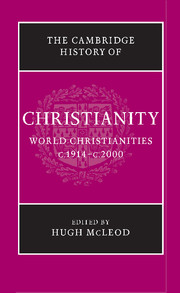Book contents
- Frontmatter
- 1 Introduction
- 2 Being a Christian in the early twentieth century
- PART I INSTITUTIONS AND MOVEMENTS
- PART II NARRATIVES OF CHANGE
- PART III SOCIAL AND CULTURAL IMPACT
- 26 Liturgy
- 27 The ‘other’
- 28 Wealth and poverty
- 29 Male and female
- 30 Christianity and the sciences
- 31 Literature and the arts
- 32 Role models
- 33 Being a Christian at the end of the twentieth century
- Bibliography
- Index
- References
28 - Wealth and poverty
from PART III - SOCIAL AND CULTURAL IMPACT
Published online by Cambridge University Press: 28 March 2008
- Frontmatter
- 1 Introduction
- 2 Being a Christian in the early twentieth century
- PART I INSTITUTIONS AND MOVEMENTS
- PART II NARRATIVES OF CHANGE
- PART III SOCIAL AND CULTURAL IMPACT
- 26 Liturgy
- 27 The ‘other’
- 28 Wealth and poverty
- 29 Male and female
- 30 Christianity and the sciences
- 31 Literature and the arts
- 32 Role models
- 33 Being a Christian at the end of the twentieth century
- Bibliography
- Index
- References
Summary
The legacy of the nineteenth century
Social and economic changes in the nineteenth century ensured that Christian teaching on wealth and poverty when it was received in the early twentieth century had been profoundly affected by new challenges. The three most important nineteenth-century developments for our purposes were industrialisation, urbanisation and colonialism. Industrialisation transformed the nature of the economy, and was a major reason for the emergence of the new science of ‘political economy’. Urbanisation brought into the cities of the industrialising nations a flood of people to work in the new factories. The rate of expansion was so rapid that the industrial cities developed vast and insanitary slums, and there was immense difficulty in providing even the most basic of services to the new industrial workforce and their families and dependants. Colonialism, particularly the growth of the British empire ‘on which the sun never set’, was an early form of what today is called ‘globalisation’. The colonies provided plentiful supplies of raw materials for the new industries in the ‘mother countries’, and huge markets for finished products. Colonialism presented itself as in the interests of the populace of the colonies, and indeed the ‘white colonies’ absorbed some of the ‘surplus population’ from the mother countries. But by the late nineteenth century, in Asia and Africa it was fairly clear that there was a massive economic drain from the colonies to the imperial nations, on which their prosperity and wealth largely depended.
- Type
- Chapter
- Information
- The Cambridge History of Christianity , pp. 514 - 533Publisher: Cambridge University PressPrint publication year: 2006
References
- 2
- Cited by



